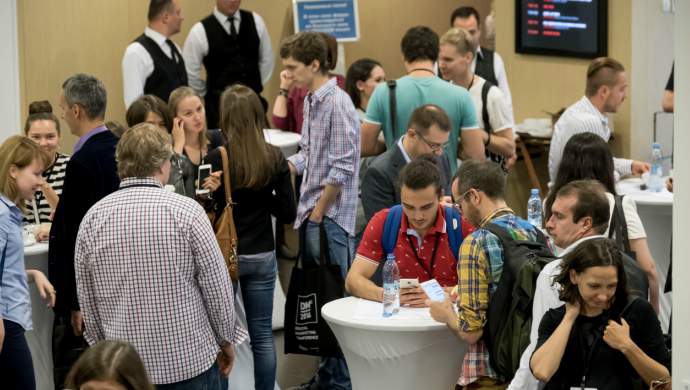After graduating, entrepreneurs should immediately seize on opportunities to take their startups to the next stage

Startups are indeed at an inflection point as they graduate from an accelerator program. Borne out of the fact that accelerators, at least good accelerators, typically impact the startup in numerous positive ways; and in this process, preparing them for next growth cycles.
Many accelerator cycles typically culminate in a demo day. So ‘graduating’ startup usually spend the last few weeks of their program preparing for the demo day – fine-tuning (or in some cases, preparing) financials, refining the deck (after inculcating what their cohort taught them constitutes a good presentation), improving their articulation abilities to investors (I’ve seen engineer-heavy teams learning a lot about this), and similar activities.
A demo day typically serves to be a great learning and networking experience – where the best of breed startups get funding commitments and others good ‘leads’ to follow-up in the upcoming months. Outcomes from a demo day range anywhere from on-the-spot funding to numerous positive conversations with follow-ups to feedback on getting funding-ready over the next few months.
And this is exactly what startups do immediately after finishing their program – taking care of unfinished business that arises as a result of participating in the accelerator. The most obvious and explicit ones are following up on investor interest and setting up meeting/calls to take the conversation further to the venerable term sheet. But there are other directional changes or adjustments, operational improvements and other learnings that need to get followed up on with great vigour and focus.
Also Read: dApp accelerators are apparently an “in” thing now, with blockchain apps going mainstream
Startups, as an example, could get trained on how to define a solid product roadmap that addresses the needs of the target market. This is often done by run small experiments to gauge market response to a new product or feature. A skill that typically involves building incrementally, testing these changes with a small sampling of the population, gauging response, analysing whether the results are in line with requirements, and iterating on this cycle till a decision is made to either make significant investments or scrap the project.
Similarly, early-stage companies learn ‘good compliance habits and general hygiene’ during their stint at accelerators – keeping and/or reconciling books monthly, sharing regular updates with colleagues and investors, maintaining good documentation over all important milestones and decisions, and similar. These habits, trivial as they might sound, are extremely important for all future conversations of a formal nature – investors, valuation experts, due diligence professionals, and corporate development groups.
Building the Proof of Concepts (POCs)
Typically, an important activity that arises from accelerators is Proof of Concepts (POCs) at larger corporations – where the startup’s product gets evaluated at length for validation. These POCs are very important from various standpoints, as success in this endeavour helps establish ‘street cred’ – acceptability of the product amongst the Technorati – leading to quick and effective market penetration.
Successful POCs lead to beachhead creations – from where an all-out market assault, with usually magnificent outcomes, can be launched. And for this reason, a lot of post-accelerator focus tends to be towards ensuring POCs go as planned; consequently, a lot of resources and even founder attention stays fixated on these early customer needs, frequent user interaction and interactions with captive engineering teams.
Also Read: Setting up your marketing anatomy by measuring what really matters
In summary, startups traverse a slightly modified, but still sloping steeply upward path after graduating from an accelerator; they continue growing and scaling albeit with more measured and educated steps and ideally by inculcating the knowledge of many industry experts.
It’s similar in some ways to the learnings acquired by a Project Manager just been through PMP certification or Product Owners through Agile training – continuing down the same path but with confidence gained through some disciplined training and through valuable lessons learned from peers and experts.
Networking
There are numerous things startups should do to ensure that the learnings and connections gained through an accelerator continue to benefit their growth on an ongoing basis. First, there are ‘explicit’ actions they could take – like bringing on industry experts they met as advisors to their enterprise. Second, they could actually institutionalize playbooks into their own corporate mainstream by creating processes that utilize the best practices learned from peers and experts during their cohort.
Then, there are ‘softer’ activities startups engage in (that emanate from cohort interaction) that also stand them in good stead in the longer run. One thing I’ve seen frequently is to create social groups (Slack, WhatsApp, etc) with people they met during their sessions.
Also Read: 7 tips for even the most timid entrepreneurs to succeed at networking events
This serves as a great sounding board to discuss/debate/ideate growth hacking tactics and sessions – and thereby, to gain from a centralized knowledge base of useful data.
It could be used to share various important data points – valuation reports, industry trends in term sheets, global technology developments, resumes to fill key hires, code samples (though GitHub is probably a better destination for this), relevant courses in AI/ML/cutting edge technologies on sites like Coursera, and literally anything that makes their daily existence simpler and more rewarding.
—
Devang Mehta is a Partner at Anthill Ventures. He is responsible for various activities in the Fund’s operations, including structuring, fund marketing, devising fund strategy, Investments and advising portfolio companies on growth strategies. Before joining, Anthill, Devang has made angel investments in and acted as a strategic adviser to, numerous startups in the Food Tech, IoT, FinTech, Healthcare, and other Technology verticals.
e27 publishes relevant guest contributions from the community. Share your honest opinions and expert knowledge by submitting your content here.
The post What are the next steps for startups graduating from an accelerator program? appeared first on e27.